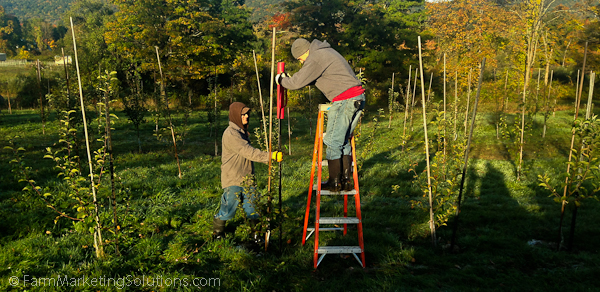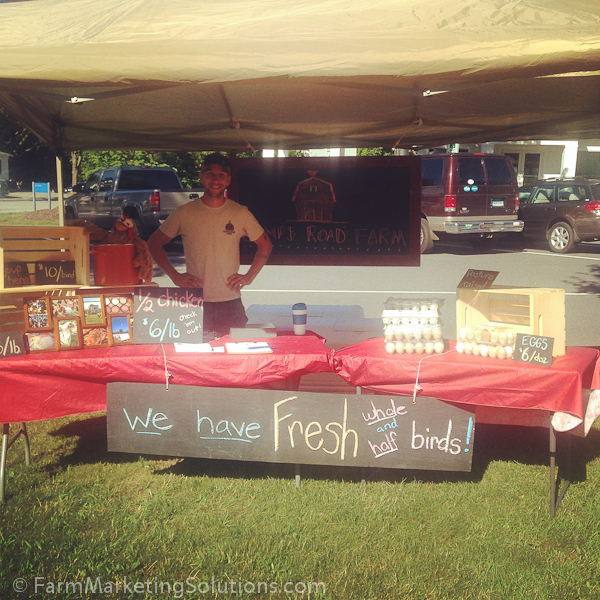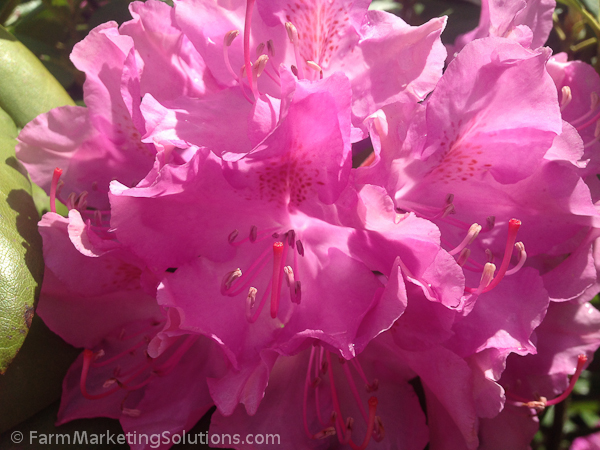GFP067: Farm Location and Branding Make All The Difference
/Farm marketing is really funny in that is can be very easy, or it can take a significant amount of effort. Today's podcast showcases a good example of both. My guests today Patti & Rick from Breakwind Farm are a good example of choosing the right farm location as well as some really successful branding centered around humor. Camps Road Farm, my farm, is a good example of poor farm location and I'll be honest, some boring branding.
Good/Bad Farm Location
When you're starting your farm and you're looking for land, an important thing to consider is how many cars pass by that spot in a given day. If it is in your farm plan to have any people actually come to your farm then natural road traffic or "good road frontage" is pretty critical to getting started. If all you have to do is make your farm look inviting and put up a farm sign with what you're offering you're in good shape.
When you're writing your farm business plan and figuring out how you are going to market your farm products, run some experiments. If you have the time and ability, set up some lawn chairs with a friend on the road in front of your farm and invest a day at different times of the year to count how many cars go by. I'm not kidding. I have been facing my own perceived reality vs. the actual numbers and sometimes it can shock you.
Once you have a number of cars at different some of the year you can calculate, "well, if 500 cars passed by, and I can get 10% of them to stop and spend $20 on average, then I can potentially gross $1000 on a Saturday (or whatever it is)." This can help you get an idea of how much to grow before you make the investment in the seeds and end up with a kitchen full of rotten tomatoes if you over produced.
That's just an idea, I literally just made that up as I'm writing this. Did I do that for my farm? No, because there's virtually no cars that drive by my farm. I've kept an eye on the road throughout the whole year, it never gets busy. Let's get into my situation.
If you live in a backwoods section of town like I do, getting people to actually come to your farm is a whole different story. It is nearly impossible for me to get people to come to the farm on a regular basis. Even though I don't feel the drive is that bad, it is just too far for some. What do I do about that? Enter my unfair advantage(s).
I have been doing a lot to encourage some more people coming to the farm. I've registered the farm location on Google Maps, I've hosted events here, I encourage sales here in the winter when farmers' markets are slow, and I am constantly inviting people up to "see the chickens". In other words marketing marketing marketing.
I also have an on-farm brewery. We're not currently zoned for brewery tours and tastings, so there's only minor benefit of people randomly stopping in to try and snoop around (yes that happens, we lock our doors at night now). If there comes a day when the brewery is open to tours and tastings then the farm should see some increase of traffic as people are drawn to the brewery. I am working on my farm store and signage to best be able to cross-market to any increase of traffic that may come to the farm as a result of my marketing and the draw of the brewery.
What do do if you don't have a brewery starting on your farm? Events and more complete offerings. I am hosting several events and workshops this year as taking more volunteer groups and doing more farm tours. If I give people a specific reason to get to the farm besides just coming to pick up a dozen eggs then my hope is that they'll have a good time, realize the drive isn't as bad as they thought, and then they'll keep coming back. What I mean by "more complete offerings" is having more for sale than just eggs when they come to farm. Even if I just grow enough vegetables (or whatever) to supply my farm store, having a more complete offering where people can come and get meat, eggs, veggies, and honey, then they have more of a reason to make the trip. A "one stop shop" if you will.
Although Rick & Patti are known for their home-made baked beans, they have other seasonal products built into their farm to keep people coming back and spending time on their farm. They offer seasonal Christmas tress, pumpkins, mums, seed starting kits, hanging plants, and even gifts/activities for kids. They talk about all of that in the podcast episode.
It is in my farm plan, and I am starting it this year, to grow and offer more variety on farm. Not only do I want to feed my family with the variety of food I'll grow, but I want to be able to provide a more complete diet for the customers who make the effort to come to the farm. Will this all work? We'll find out in time. You can bet I'll be talking about it here.
Funny/Bland Branding
I mean come on, Breakwind Farm, how can you not at least give a little chuckle when you hear that? Rick & Patti have built a fair amount of humor and satire into their farms' branding. That humor has made them approachable, has made them a magnet for media, and has allowed them to sell baked beans with the name FARTOOTEMPTING. What do you get from the first four letters of that?
They are similar to Lucie of Locally Laid Egg Company. "Local chicks are better" and "Get locally laid" I mean, come on now. Their branding is good enough that they're in Minnesota and I've heard of them over here in Connecticut.
Now Camps Road Farm is not bad branding, just a little bland branding. I didn't choose it, and nothing against the guys who did, but it is a bit more work to get people to give a crap about Camps Road Farm. Camps Road Farm is located on Camps Rd. which is half a mile from the more locally famous Camps Flat Rd. I cannot tell you how many times I've had the conversation of, "no no, not Camps Flat Rd., Camps Rd. If you keep going on Camps Flat you'll reach Sawyer Hill and that leads to Camps Rd. a little further East."
Am I saying that I would prefer a funny name? Honestly no, Camps Road Farm (CRF) works really well for our goals, and a brand can be what you make of it. While we're not going to get the buzz of a name that has to do with farts or sex, we'll instead earn our reputation from what we produce and the stories we tell. It takes longer and is more work, but fits well with our holistic goals.
What's the take-away from all this? Pick a brand that you like and fits your personality and the personality of your farm. A brand is only as good as the people behind it.
Right click here to download the MP3
In this farm podcast you will learn:
finding an idea and running with it
accepting a challenge
the role location and branding play in your farm business
how to get people on your farm and keep them coming back
the role humor can have with your farm business (hopefully a big role)
Interview with Rick & Patti of Breakwind Farm
Breakwind Farm is family run business. They started selling fresh vegetables, herbs, seasonal flowers and baskets, pumpkins and wreaths at a stand outside their house in 2009 and more recently at the Contoocook Farmers Market. They have enjoyed welcoming their new and returning customers each year. They concocted the idea of Breakwind Farm's four varieties of FARTOOTEMPTING Baked Beans in the spring of 2011 and started selling them at the Farmers Market where they quickly became a hit.
It wasn't long before their beans were being requested at local fairs, festivals and other venues. They added FARTOOTEMPTING Breakwind Bean t-shirts to their product line by the end of the summer and they too have become a hit. They have four mouth-watering flavors of baked beans, each offering a unique taste, all guaranteed vegan, gluten free, dairy free, and delicious!
Items mentioned in this farm podcast include:
Permaculture Voices Conference in San Diego March 4th - 8th
PV2 isn’t just another permaculture convergence that focuses on hyper-local DIY skill building and resiliency; we instead decided to look bigger.
We are blending the practical techniques and tactics found in workshops with the entrepreneurial spirit and opportunity of a business conference.
We have brought together a diverse group of creative and innovative doers in a variety of fields looking to share experiences, knowledge, connect, and create in ways that increase passion, purpose and profit. These doers come from a variety of fields both within and outside of permaculture. Each field has its own needs and yields. It is this edge that creates the opportunity for things to happen, and it is this opportunity that offers value to the attendees – how can you fill needs and utilize yields to create more value in your life.
Farm Finance Challenge
Click here for the HUB with all the farms
For the first posting we had some farms that chose to publish late due to whatever reason. Farm life, sick kids, etc... Nothing wrong with that. As we move forward we are all trying to publish as a group on the 15th of every month. So the middle of every month going forward we will have our reports up and to you guys so that we can all grow as a farming community.
Fresh Farm Aquaponics
Aquaponics and Consulting
Gross Income: $2210.31
Expenses: $262.27
Humble Hill Farm
Vegetables and Fruit
Gross Income: $1043.00
Expenses: $6365.23
Take aways:
Are you maximizing the potential of the traffic you get on your farm? Are you giving them a reason to come back?
What message are you sending with your brand?
Farm Quote of the Episode
"A brand for a company is like a reputation for a person. You earn reputation by trying to do hard things well." - Jeff Bezos
--
Thanks for taking the time to listen in, and let me know what you think. You can leave a comment below, send me an e-mail, reach me on Facebook , or leave a 5 star rating in iTunes if you liked the show.


























































































